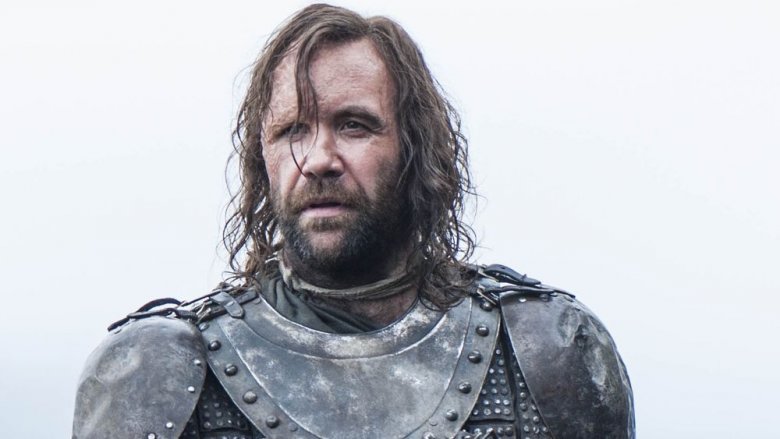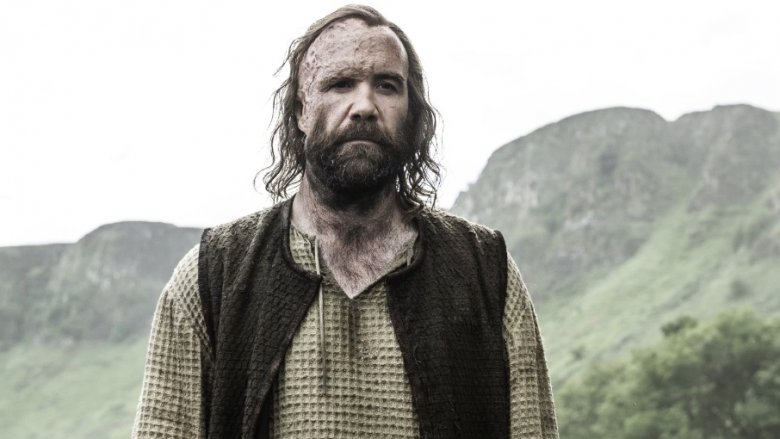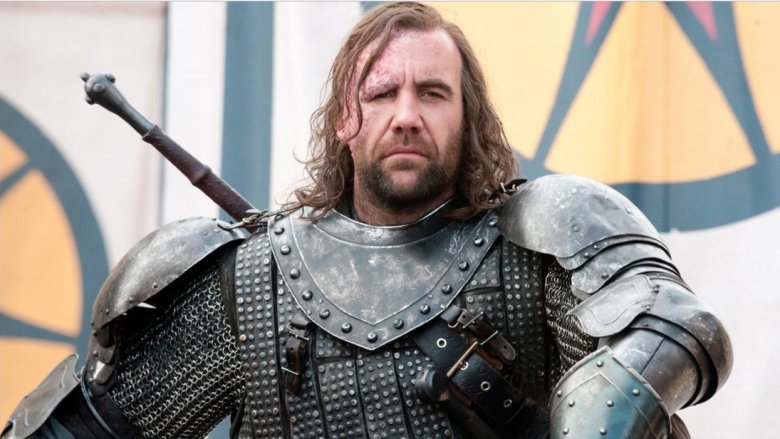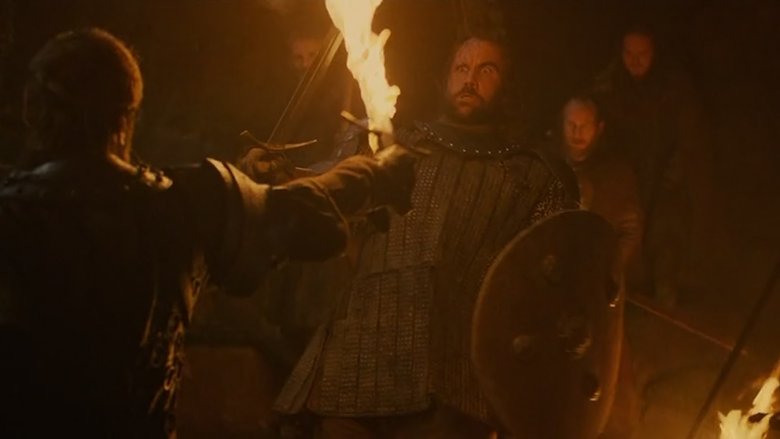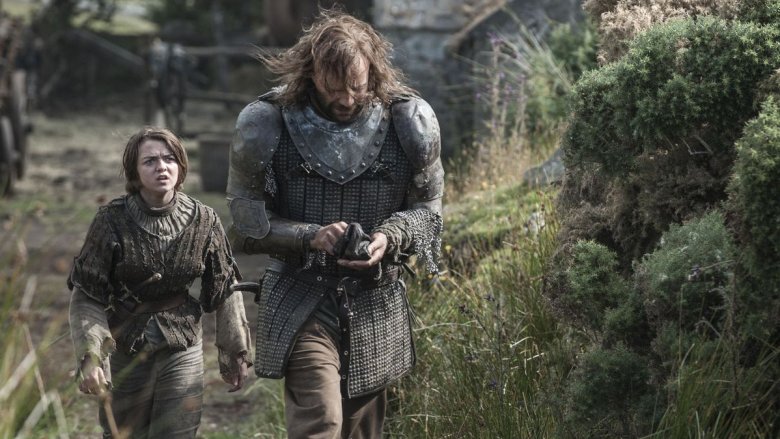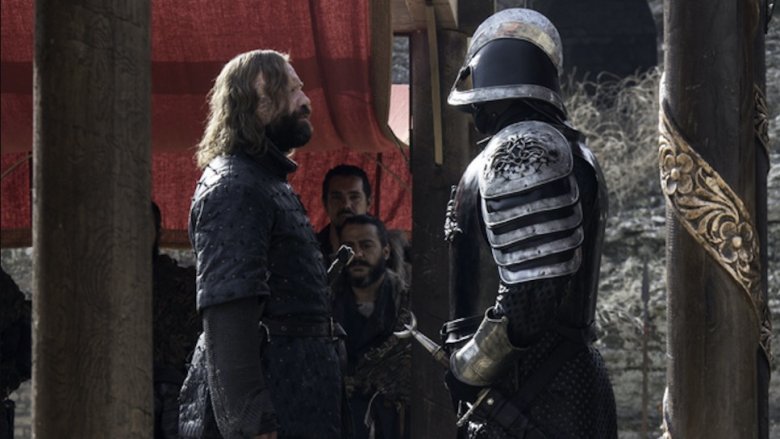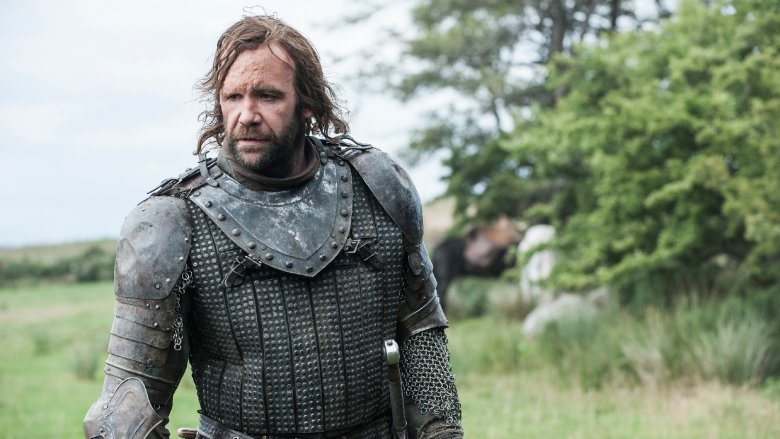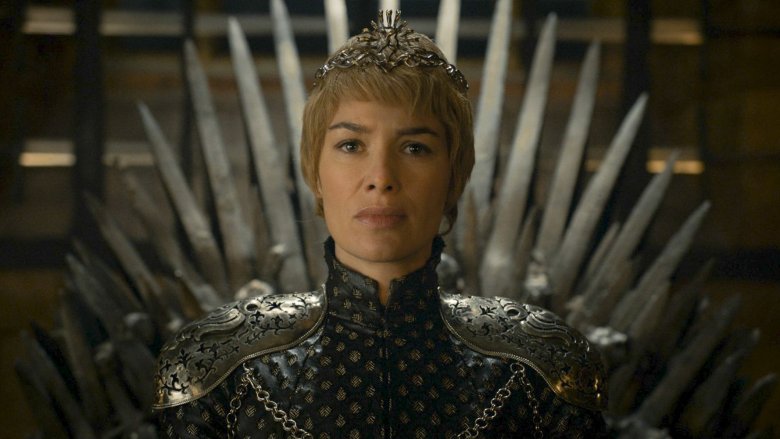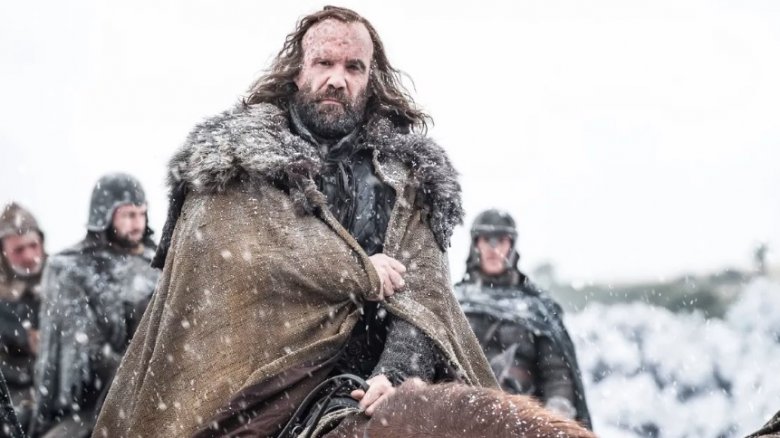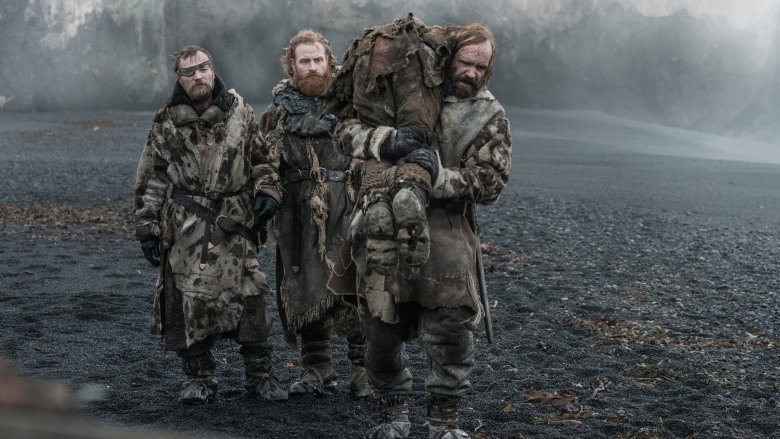Why The Hound Is Even More Important To Game Of Thrones Than We Realized
As the long-awaited conclusion to Game of Thrones nears (at least for television viewers), fans are becoming increasingly desperate to find out who lives, who dies, and who rules over it all in the finale. Even after years of bloody betrayals and unanticipated assassinations have thinned down the cast, there's still a sizable group of protagonists that are all likely to have a big impact on the show's final battles. From Jon Snow's royal heritage to Daenerys' weapons of dragon destruction, there are a lot of cards in play for the final season.
But while everyone keeps playing the game of thrones (see what we did there?), there are some characters with decidedly more working-class concerns. Chief among them is Sandor Clegane, a.k.a. the Hound, a world-weary warrior with a very not-safe-for-work catchphrase. While more noble men have been put to death or betrayed or sacrificed for the greater good, the Hound keeps puttering along through multiple near-fatal storylines. What does it all mean? Well, it's obvious to say that anyone still breathing in the final season will have an impact on events, but the Hound might matter a bit more than just any tough guy with a sword. Read on to find out how the Hound might just be more important than you realized in the final season of Game of Thrones.
A religious awakening
One big reason that the Hound has become such a fan favorite over the years is that he's eminently relatable — in a world of dragons, ice zombies, and Machiavellian sociopaths, he doesn't really like anyone, and he only trusts himself and a sword. He occasionally does the right thing, so long as the right thing doesn't inconvenience him. But as the show's ramped up in fantasy tropes from the relatively sparse early episodes, the Hound's continuing atheism has become a larger plot point.
After his near-death experience at the hands of Brienne in season four, the Hound recuperated under the watchful eye of Brother Ray. Ray revealed to the Hound that they weren't so different; before Ray served the Faith of the Seven, he was a mercenary with no interest in doing the right thing. Shortly after, Ray is brutally killed by roving members of the Brotherhood Without Banners because Game of Thrones is a cruel mistress. Still, the Hound's brief connection with the man seems to have been setting up an about-face for the consistently amoral swordsman. After all, it's only after Ray's death that the Hound gets involved with the religious and unkillable Beric Dondarrion, which leads him into the path of the Night's King and his zombie army. With Ray's religious teachings fresh in his mind, the show's primed us for a powerful moment when the Hound realizes there are things bigger than him in the world — and no, we're not just talking about his literal big brother.
The Hound who was promised?
Between the books, the television show, and the many, many fan theories, you'd be forgiven for losing track of some of the various prophecies floating in the Game of Thrones universe. Still, there's at least one that you should definitely be thinking about before the final season (well, two, but we'll get to that later). That would be the prophecy that concerns Azor Ahai, or the Prince That Was Promised. The basic summary is that Azor Ahai was a legendary swordsman who was able to forge a sword so powerful that it burst into flames and he fought against, and won against, a darkness that threatened the world. Just about every character on the show has been theorized to be Azor Ahai reborn, although Jon Snow and Daenerys are two of the fan favorites by a mile.
However, one fan has a compelling theory: that the Hound is actually Azor Ahai. The main crux of the theory is that it would be poetic for the Hound, a man who believes in nothing and has a paralyzing fear of flame and fire, to wield a holy flaming blade against the Night's King in a grand show of selflessness. While it might be a bit of a stretch to suggest that the Hound is reborn nobility, his relationship to the current wielder of a flaming sword, Beric, definitely gives one pause. The two have had a long history, and if Beric were to actually die for good, it would only be fitting for the Hound to pick up his flaming sword in battle.
Going up in flames
Okay, so he might not be the fabled Prince That Was Promised; that would be a pretty late twist for a show that's generally been slightly more fair in story setups. Still, it's almost certain that the Hound will resolve his phobia of fire, and there's good reason to believe he'll do so by picking up Beric's flaming sword. As true Throne-heads know, the Hound has a deathly fear of flame that originated when his brother shoved his face in the fire during their childhood — an event that also gave everyone's favorite dogged mercenary his trademark scarred face.
It's character building 101 for a character to overcome trauma over the course of an arc, and the Hound's due for some exposure therapy with fire. There's also the fact that there's a god in the world of Game of Thrones that specializes in fire... and he's already been in contact with the Hound. At the beginning of season seven, the Hound sees a vision of the Night's King and his army, courtesy of R'hllor, the Lord of Light. Beric, Thoros, Melisandre, and various other characters in GoT have expressed their faith in the Lord of Light, but the Hound is the first non-follower we've seen the god undeniably send divine wisdom. It all adds up to a near certainty that the Lord of Light — who you'll remember is also a god of fire — is maneuvering a man terrified of fire into doing his divine bidding. How poetic.
The Hound and his pup
The Hound is important for reasons far beyond his aversion to fire, though. There's also his relationship to a more metaphorical firecracker: Arya, the pre-teen assassin who's been going around Westeros avenging everyone who betrayed her and her family. She's got a list and she's checking it more than twice. One person who's gotten off the list without getting offed is the Hound, who Arya believes to be dead after his brutal fight with Brienne. At the time, the Hound told her to kill him out of a mixture of paternal pride, guilt, and probably a desire to just get the whole "dying" thing over with. Instead, Arya walked away, leaving him to die on his own, alone.
Unbeknownst to her though, they were just flesh wounds, and the Hound is definitely alive and kicking. Brienne doesn't seem to bear him very much ill will, considering their charming chat on the way to see Cersei at the end of season seven, but Arya's a different story. Will she forgive her quasi-dad for his role in her real dad's death? Or will she put him back on her list and kill him herself? Whatever her decision, their reunion is certain to be one of the most exciting parts of season eight, and is guaranteed to have no small effect on the season's larger storylines.
Cleganebowl
Arya's not the only one that the Hound has unfinished business with. If there's one single thing that Game of Thrones fans want from the final season, then it has to be Cleganebowl. A fan term for the long-awaited battle between the Hound and the Mountain, Cleganebowl has been demanded, doubted, and in season seven, seemingly confirmed. The Hound walked up to the Mountain and told his big brother, "You know who's coming for you. You've always known." The two brothers might have had a short-lived duel back in season one, but they've been through the wringer since then. The Mountain was poisoned by Oberyn Martell, which led to him becoming a mute, zombie-esque slave to Cersei Lannister. Meanwhile, the Hound's been up and down Westeros in search of meaning (or more accurately, in search of chicken). Regardless, the two don't seem to have forgotten their childhood enmity for each other.
The real question is just what form Cleganebowl will take. Will the Hound get his chance to fight his brother when Cersei breaks the temporary alliance against the Night's King? Or could the Hound's penchant for mucking things up (remember when he threw a rock at a wight which lead to the Night's King breaking down the Wall?) mean that he's going to ruin the truce for the short-term satisfaction of trying to kill the Mountain? And don't forget that the Mountain is on Arya's list, which could be the catalyst for the three characters coming together — and no doubt coming to blows.
The Hound's redemption
Of all the enemies that the Hound has battled against and might battle in the final season, arguably the most difficult could be... himself? (After Brienne, of course.) For nearly seven seasons now, the Hound has tried to make his way through Westeros looking out for number one. Even the odd moments of humanity and goodness were usually covered with a somewhat logical explanation of how it benefited him. That all changed in season seven, when the Hound had to confront not only divine providence and ice zombies, but the actual real consequences of his actions.
Way back in season three, Arya and the Hound stayed with a farmer and his daughter. After sharing dinner with them, the Hound stole their money, justifying that they would die anyway so he might as well profit. When the Hound and Beric camp there in season seven, he finds out that he was right; the farmer and his daughter did die, but likely because they had their silver stolen in the first place. Seeing their dead bodies was enough for the Hound to go out of his way to bury them, offering some measure of respect for the lives they led. That all seems to point toward a redemption arc for the Hound. In the parlance of D&D alignment, the Hound blundered his way through Westeros as a true Neutral character, but he seems due for an alignment switch to Neutral Good.
The Hound just might kill Cersei
This idea is admittedly a long shot. It's dependent on breaking storytelling and narrative conventions so hard that viewers would probably riot, and we all know that the show's never done that. Except for the Red Wedding. Or Jon's resurrection. Or... well, we'll just explain and let you make up your own mind: There's a fan theory that the Hound might be the one to finally kill Cersei. As any good Game of Thrones viewer knows, there's a pretty long line of people that wants to kill her. Even beyond them, a popular fan theory holds that Tyrion or Jaime will be the one to put an end to her, largely on the strength that a prophecy (which wasn't echoed on the show) that declares that Cersei will die at the hands of the valonqar — High Valyrian for "little brother."
Sure, Tyrion and Jaime are both Cersei's little brothers (Jaime might be her identical twin, but he was born briefly after Cersei), but the prophecy doesn't specify that it's specifically Cersei's little brother that will do the deed. At this point, the Hound is one of the few remaining characters that is both important enough to actually do the deed and a character that qualifies as a little brother. Sure, it's a long shot, but the show's surprised audiences before. Why not one more time?
A Song of Ice and Fire, not Game of Thrones
Super fans of George R.R. Martin's work might already know this, but his books aren't actually called Game of Thrones — the actual term for the series is a A Song of Ice and Fire, and it's only the first book that's titled Game of Thrones. The television show obviously did away with this naming convention, but it's important primarily because one of the big overarching themes of both versions of the story is that royalty and feudalism isn't exactly a good thing. There's no end of examples of terrible royalty in the world of Game of Thrones, and even the best leaders like Jon Snow or Mance Rayder are great primarily because of their experience as common people. As Jorah Mormont says early in the show, "The common people pray for rain, health, and a summer that never ends. They don't care what games the high lords play."
Jorah's not exactly wrong — if you were to live in King's Landing during the sixth season of Game of Thrones, you'd be more concerned about surviving a literal bombing perpetrated by a conspiracy that originated in the palace than you would be about whether Cersei is actually your queen or not. Does it really matter who sits on the Iron Throne, as cool a chair as it might be, if your life as a regular citizen of Westeros is terrible?
A Hound of the people
Why do we bring all that up? Primarily because the television show arguably has one very obvious main character: Jon Snow. He's torn straight out of any fantasy novel of the last few decades. Handsome, adept with a sword, secretly born to royalty but given a pauper's upbringing so he has humility... it sure seems like Jon is guaranteed to be Azor Ahai, take the Iron Throne, and single-handedly drive back the Night's King.
But this is Game of Thrones, a show that's built a reputation out of being absolutely ruthless to characters. If the show and the books are telling a long-running story about the dangers of a ruling class and the petty game that the "high lords" play, well, the Hound is a pretty perfect character to become a man of the people. He's discovered morality, been a quasi-father, and seen firsthand how little most kings and queens care about their subjects. In short, he's been a man among the people, far more than Jon Snow, who almost immediately got promoted to leader of the Night's Watch. If the show's got some tricks up its sleeve heading into the final season, chances are you can expect the Hound to play a big role. After all, greatness can come from anywhere, any upbringing. Isn't that the metaphorical power of the King Arthur myth in the first place?
